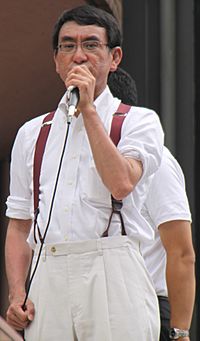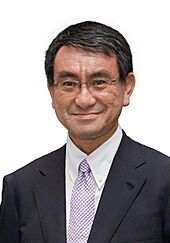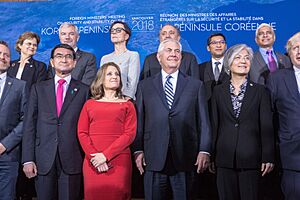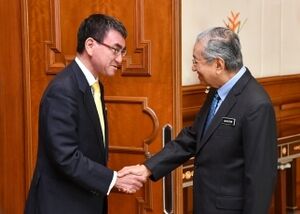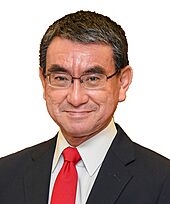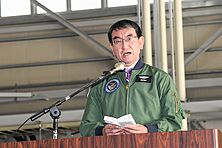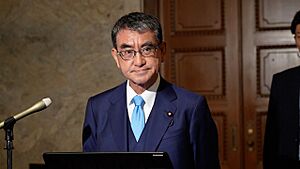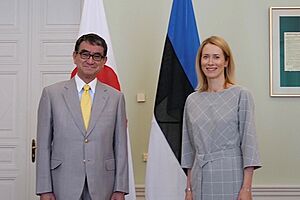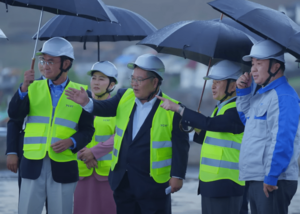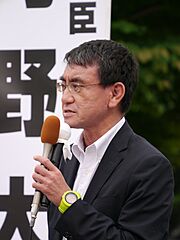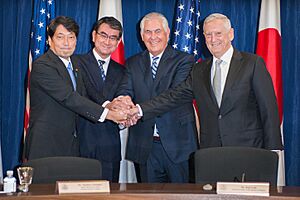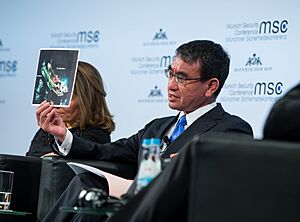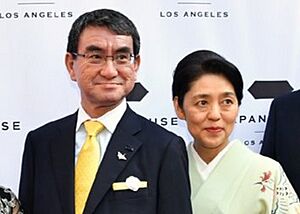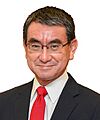Taro Kono facts for kids
Quick facts for kids
Taro Kono
|
|
|---|---|
|
河野 太郎
|
|
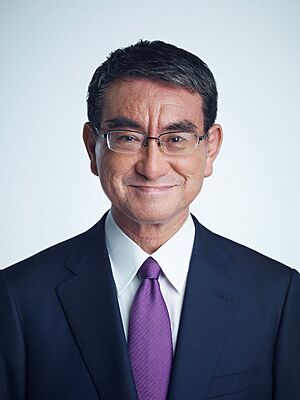
Official portrait, 2021
|
|
| Minister for Digital Transformation | |
| In office 10 August 2022 – 1 October 2024 |
|
| Prime Minister | Fumio Kishida |
| Preceded by | Karen Makishima |
| Succeeded by | Masaaki Taira |
| Minister for Administrative Reform and Regulatory Reform | |
| In office 16 September 2020 – 4 October 2021 |
|
| Prime Minister | Yoshihide Suga |
| Preceded by | Ryota Takeda |
| Succeeded by | Karen Makishima |
| In office 7 October 2015 – 3 August 2016 |
|
| Prime Minister | Shinzo Abe |
| Preceded by | Haruko Arimura |
| Succeeded by | Kozo Yamamoto |
| Minister of Defense | |
| In office 11 September 2019 – 16 September 2020 |
|
| Prime Minister | Shinzo Abe |
| Preceded by | Takeshi Iwaya |
| Succeeded by | Nobuo Kishi |
| Minister for Foreign Affairs | |
| In office 3 August 2017 – 11 September 2019 |
|
| Prime Minister | Shinzo Abe |
| Preceded by | Fumio Kishida |
| Succeeded by | Toshimitsu Motegi |
| Chairman of the National Public Safety Commission | |
| In office 7 October 2015 – 3 August 2016 |
|
| Prime Minister | Shinzo Abe |
| Preceded by | Eriko Yamatani |
| Succeeded by | Jun Matsumoto |
|
|
| Assumed office 21 October 1996 |
|
| Preceded by | Constituency established |
| Personal details | |
| Born | 10 January 1963 Hiratsuka, Kanagawa, Japan |
| Political party | Liberal Democratic |
| Spouse | Kaori Kono |
| Children | 1 |
| Parent |
|
| Relatives | Ichirō Kōno (paternal grandfather) Kenzō Kōno (great-uncle) Jihei Kōno (great-grandfather) Heizaburo Tagawa (great-grandfather) |
| Alma mater | Keio University (no degree) Georgetown University (BS) |
Taro Kono (河野 太郎, Kōno Tarō, born 10 January 1963) is a Japanese politician. He was the Minister for Digital Transformation from 2022 to 2024. He is a member of the Liberal Democratic Party (LDP).
Before his digital role, he was the Foreign Minister and Defense Minister. He also served as Minister for Administrative Reform. Taro Kono has been a member of the House of Representatives since 1996. He represents the 15th district of Kanagawa.
Born in 1963, Taro Kono grew up in a family involved in politics. His father, Yōhei Kōno, was a Speaker of the House of Representatives. Taro Kono studied at Georgetown University in the United States. After working in business, he was first elected to the House of Representatives in 1996. He is known for his strong opinions and large following on social media.
Contents
Early Life and Education
Taro Kono was born on January 10, 1963, in Hiratsuka, Kanagawa. He is the oldest of three children. His family has a long history in Japanese politics. His father, grandfather, and great-uncle were all active politicians.
Kono went to Hanamizu Elementary School and Keio Middle and Senior High Schools. He started studying economics at Keio University in Japan. However, he decided to go to the United States instead.
In 1982, he moved to the U.S. He attended Suffield Academy and Georgetown University. There, he studied comparative politics. He also worked for U.S. politicians like Senator Alan Cranston. He even spent time studying in Poland. Kono said his time abroad helped him see Japan from a different perspective.
He graduated from Georgetown University in 1985. He then worked for companies like Fuji Xerox. In 1993, he joined Nippon Tanshi, a company that makes electric parts for major car and electronics brands.
Political Career
Becoming a Member of Parliament
Taro Kono was first elected to the House of Representatives of Japan in October 1996. He was 33 years old. He won a close election in the new Kanagawa 15th district. This area includes the cities of Hiratsuka and Chigasaki.
Since then, he has been re-elected many times. His support grew with each election. In 2005, he received the second-highest number of votes in Japan's election history.
Kono served on several important committees in the House of Representatives. These included committees for Economy, Environment, and Finance. From 2002 to 2006, he held roles like Parliamentary Secretary for Public Management and Senior Vice Minister of Justice.
In 2002, he became Director of the Foreign Affairs Committee. He resigned two months later to protest the Iraq War. He felt the government did not explain its policy well enough. Kono was one of the few members of his party to oppose sending Japanese forces to Iraq.
In 2004, Kono became Assistant Secretary-General of the Liberal Democratic Party. He was also the youngest Prefectural Chairman for the LDP in Kanagawa. He helped pass laws allowing the government to declare economic sanctions on other countries. He also supported a bill to refuse entry to foreign ships from Japanese ports. These laws were aimed at countries like North Korea.
Kono ran for President of the LDP in 2009 but did not win. He later became Deputy Secretary-General of the LDP in 2010.
Roles in the Abe Government
In October 2015, Prime Minister Shinzo Abe appointed Kono to several roles. He became Chairman of the National Public Safety Commission. He was also in charge of administrative reform and disaster management. He helped organize security for the 2016 G7 summit.
He left these roles in August 2016 during a cabinet change.
Minister of Foreign Affairs
On August 3, 2017, Prime Minister Abe made Kono the Foreign Minister. He replaced Fumio Kishida. Kono was chosen because he spoke excellent English and understood global issues. He was seen as a more flexible diplomat.
As Foreign Minister, Kono worked on Japan's response to the North Korean crisis. He urged countries to cut ties with North Korea. He also worked to strengthen Japan's alliance with the United States. His appointment was seen as a way to improve relationships with China and South Korea too.

During his time as Foreign Minister, Japan had a trade disagreement with South Korea. He also traveled a lot, visiting 59 countries over two years.
Minister of Defense
On September 11, 2019, Kono became the Minister of Defense. In this role, he worked to strengthen defense cooperation with countries like Australia and India.
In 2020, Japan decided to cancel the Aegis Ashore missile defense system. Kono said this was due to high costs and technical problems. He also warned China that Japan's military would respond to any intrusions near the Senkaku Islands.
In September 2020, Kono described China as a "security threat" for the first time. He said this was important for his role as Defense Minister.
Suga Government and Vaccine Rollout
When Prime Minister Shinzo Abe resigned in August 2020, Yoshihide Suga became the new Prime Minister. Suga kept Kono in his cabinet. Kono returned to his role as Minister for Administrative Reform. His job was to cut down on government rules and waste.
Kono set up a suggestion box on his website for ideas on administrative reform. It received so many comments that he had to temporarily close it.
In January 2021, Japan declared a state of emergency due to the COVID-19 pandemic. Prime Minister Suga put Kono in charge of Japan's vaccine rollout. Kono worked with health agencies and companies to get vaccines to people. He became known as Japan's "Vaccine Czar." By the end of his term, almost 70% of Japan's population had received at least one vaccine dose.
2021 LDP Leadership Election
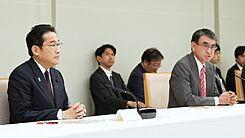
In September 2021, Prime Minister Suga announced he would not seek re-election. Taro Kono then announced he would run for LDP President. He faced some criticism for blocking people on Twitter during the election.
On September 29, Kono made it to the second round of voting. However, he lost to Fumio Kishida. After the election, Kono became the LDP's Public Relations chief. He left the cabinet a few days later.
Kishida Government and Digital Transformation
After Kishida became Prime Minister, Kono was not initially in his cabinet. He served as a regular member of parliament.
In July 2022, former Prime Minister Shinzo Abe was sadly assassinated. This event led to changes in the government. In August 2022, Prime Minister Kishida appointed Kono as the Minister for Digital Transformation. He was also in charge of consumer affairs and civil service.
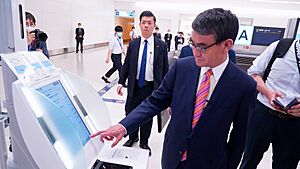
One of Kono's main goals was to improve the My Number identification card system. He aimed to have most residents use these cards. However, there were some issues with linking incorrect information to cards. Kono apologized for these errors and worked to fix them.
In September 2022, Kono famously "declared war" on floppy disks. This was part of his effort to modernize government processes. He wanted to replace old methods with online services. By June 2024, he announced that the government had mostly stopped using floppy disks. He also aimed to reduce the use of hanko stamps and fax machines.
2024 LDP Leadership Election
In 2024, Kono ran for LDP President for the third time. He announced his candidacy in August. He said he wanted to "move the country forward." He also talked about returning to "fiscal austerity" and asking lawmakers to return kickbacks.
He stated that the Japanese Constitution's Article 9 should include "collective self-defense rights." His campaign also proposed labor market reform and using renewable energy. Kono did not win the election, coming in eighth place. He then resigned as Digital Affairs Minister.
After the 2024 Election
After the election, Kono returned to being a regular member of parliament. In the 2024 general election, he was re-elected for the tenth time. In November 2024, he started working at the LDP's Election Headquarters.
In January 2025, Kono started a study group to look at reforms for social security. In July 2025, he traveled with the Emperor and Empress of Japan during their visit to Mongolia. He shared updates from the trip on his Twitter account.
After the LDP-Komeito coalition lost its majority in the July 2025 Upper House elections, Kono resigned from a party leadership role. He criticized the party's Secretary-General for the election losses.
Political Views
Taro Kono is often called a "maverick" in politics. This means he sometimes holds views different from his party. He is considered a moderate within the LDP.
Social Issues
Taro Kono supports legalizing same-sex marriage. He also believes married couples should be able to keep their separate last names.
He has worked on rules for genetically modified organisms (GMOs). Kono has said he would not visit Yasukuni Shrine if he were prime minister. He believes a new national memorial would be better to honor war dead. This would help reduce tensions with neighboring countries.
In 2019, Kono suggested that Japanese names in English should be written with the family name first. This is the traditional Japanese way.
Energy and Economy
Kono does not support the government's nuclear energy policy. He opposes building new nuclear power stations. He believes Japan should reduce its reliance on nuclear energy. He has said that nuclear power has dangers beyond explosions.
He has supported raising the consumption tax. He believes the money should go to the national pension system. Kono also supports more immigration to Japan. He thinks it can help with Japan's shrinking population and labor shortages.
Imperial Family
In 2020, Kono said that female emperors should be considered to ensure a stable succession to the Imperial Throne. He suggested that Imperial princesses, like Aiko, Princess Toshi, could become emperor. He believes this would help maintain the Imperial Family's future.
Foreign Policy
Kono is seen as someone who focuses on Asia. He has strong ties with the United States. He wants to strengthen the relationship between South Korea and Japan. He believes these two countries should work together more closely.
Kono has worked to improve travel and business between Japan and Korea. He is the only Japanese lawmaker with a Korean webpage. He also offers internships to Korean nationals.
He supports changing Article 9 of the Japanese Constitution. This would allow Japan's military to engage in warfare. He also supports the Japan-U.S. Security Treaty.
In May 2023, he said he supported Japan joining AUKUS in the future. AUKUS is a security partnership between Australia, the UK, and the US.
Personal Life
Taro Kono is married to Kaori. They have a son named Ippei, born in 2002. They enjoy scuba diving and watching movies.
In 2002, Kono donated part of his liver to his father, who was ill. Kono has since supported changes to laws about organ donation.
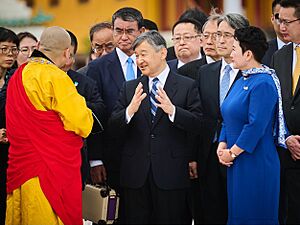
Kono is a fan of Shonan Bellmare, a professional football club. He was the team's chairman from 2000 to 2005. He is also involved in other sports organizations. He taught a class at Hosei University.
His favorite food is durian. He is known for wearing suspenders and carrying a purple briefcase. TIME magazine called him a "lovable eccentric" in 2023. He is also very active on Twitter, with millions of followers.
In November 2023, Kono was told off for trying to use his smartphone during a committee meeting. He was trying to answer a question.
Images for kids
See also
 In Spanish: Tarō Kōno para niños
In Spanish: Tarō Kōno para niños


